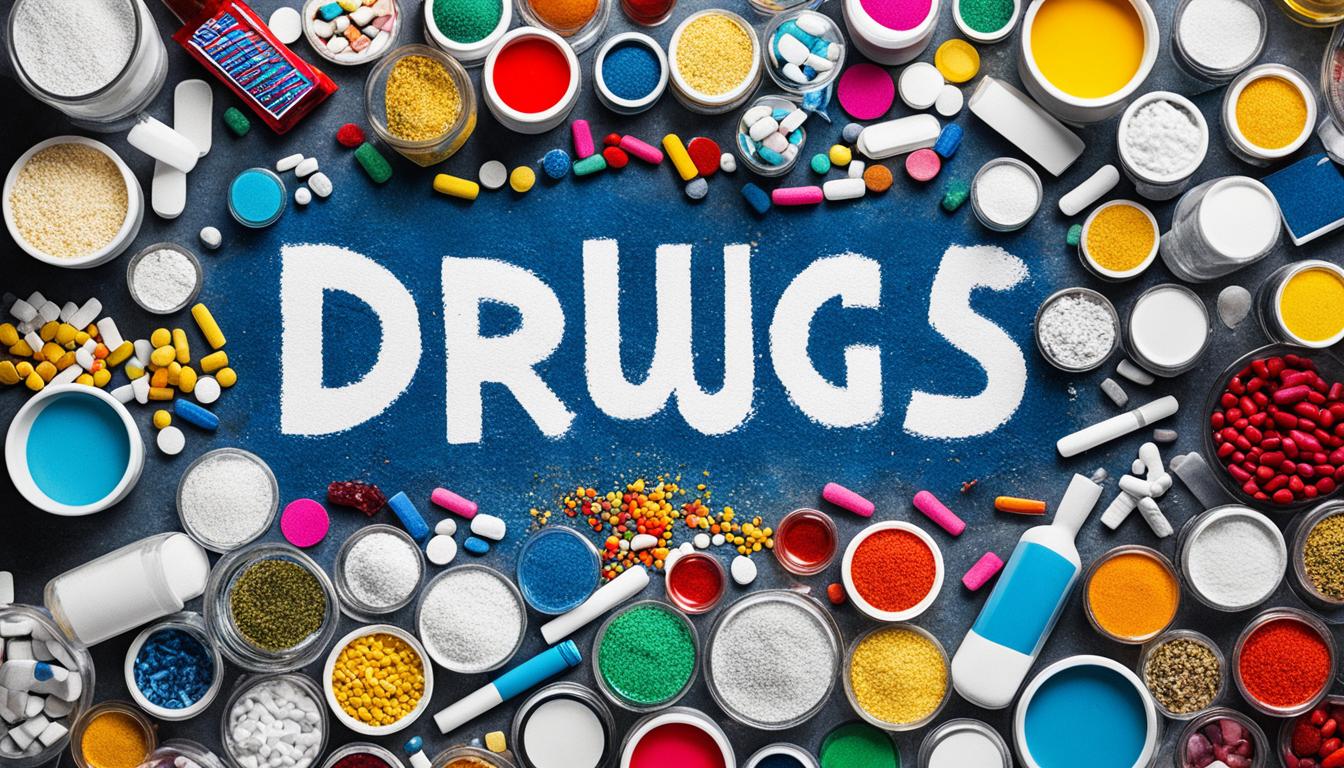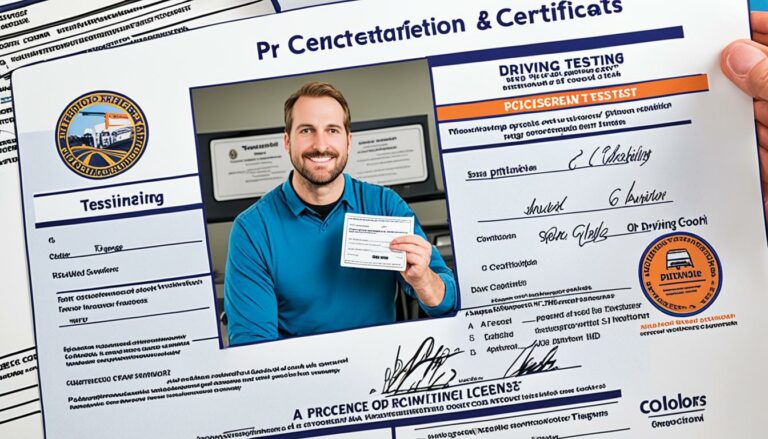Understanding Teen Drug Use Motivations
Teen drug use is a complex issue that requires a deeper understanding of its motivations. Why do teens do drugs? What are the reasons behind teen drug use? By examining the underlying causes and influences, we can develop effective strategies to address teenage drug abuse and promote healthier behaviors.
A study conducted on young poly-drug users revealed some common motivations behind teen drug use. These include seeking relaxation, intoxication, staying awake at night while socializing, enhancing activities, and alleviating a depressed mood. It is important to note that substance use functions may vary by age and gender, highlighting the need for tailored prevention and education efforts.
Key Takeaways:
- Teen drug use is driven by various motivations, including relaxation, intoxication, socializing, mood improvement, and activity enhancement.
- Understanding the specific reasons behind teen drug use is crucial for developing effective health education and prevention strategies.
- Substance use can be influenced by factors such as peer pressure, parental influence, stress, social and cultural factors, immediate gratification, and inaccurate information.
- Educating teenagers about the risks and consequences of drug use is essential for preventing and reducing teen drug abuse.
- By addressing the underlying motivations, we can mitigate the risk of teen drug addiction and promote healthier choices among teenagers.
Influence of Peer Pressure on Teen Drug Use

Peer pressure can be a powerful influence on a teenager’s decisions, including whether or not to use drugs. Seeing their friends and peers engaging in substance use can make it seem normal and desirable. Teenagers may feel pressured to fit in and conform to the behaviors and activities of their social group.
According to a study conducted by the National Institute on Drug Abuse, peer pressure is one of the factors that significantly contribute to drug experimentation and regular use among teenagers. The desire to be accepted and avoid social exclusion can drive adolescents to engage in substance use, even if they initially had no interest.
Media Influence and Peer Pressure
In addition to the influence of peers, media portrayals of substance use can also contribute to the appeal of drugs and alcohol among teens. Movies, TV shows, and social media often glamorize substance use without adequately addressing the potential consequences. When exposed to these messages, teenagers may perceive drug use as exciting, cool, or rebellious.
“Peer pressure can influence teenagers to engage in behaviors they would not typically choose on their own.” – National Institute on Drug Abuse
Peer pressure and media influence interact to shape a teenager’s perception of drugs and alcohol. The desire to belong and the fear of missing out can override rational decision-making, pushing teenagers to experiment with substances and engage in risky behaviors.
Educating Teens about the Risks
To combat the influence of peer pressure on teen drug use, it is crucial to provide accurate information about substance abuse, its risks, and the potential consequences. By educating teenagers about the short-term and long-term effects of drugs, we empower them to make informed choices and resist the pressure to use substances.
Building Resilience and Assertiveness
Developing resilience skills and assertiveness can help teenagers navigate peer pressure and resist engaging in substance use. Teaching them to set boundaries, say “no” confidently, and seek out positive peer groups and activities can provide them with the tools to resist negative influences.
It is important to create a supportive environment where teenagers feel comfortable discussing their concerns and fears about peer pressure. Open lines of communication with parents, teachers, and trusted adults can help teenagers understand the risks associated with substance use and empower them to make healthier choices.
Influence of Parental Factors on Teen Drug Use
Parents and caregivers play a crucial role in shaping their teenager’s attitudes towards drugs and alcohol. Parental influence on teen drug use is significant, as teenagers observe and internalize their parents’ behaviors and choices.
Teenagers often witness their parents and other adults consuming substances like alcohol and tobacco. These observations can normalize substance use in their eyes and create the perception that it is a socially acceptable behavior.
Family dynamics, communication patterns, and parenting styles also contribute to the influence parents have on their teenager’s drug use. An open and supportive family environment, characterized by strong communication, trust, and positive role modeling, can reduce the risk of teen substance abuse.
Research has shown that parental monitoring and involvement have a protective effect against teen drug use. When parents are actively engaged in their teenager’s lives, monitoring their activities, and setting clear rules and expectations regarding substance use, teenagers are less likely to experiment with drugs and alcohol.
On the other hand, families with poor communication, inconsistent discipline, or parental substance abuse issues may increase the risk of their teenager engaging in drug use. The lack of parental guidance and involvement can leave teenagers vulnerable to peer influence and susceptible to experimenting with substances.
It is essential for parents to be aware of their influence and take proactive steps to positively shape their teenager’s attitudes towards drugs and alcohol. By being positive role models, discussing the risks and consequences of substance use openly and honestly, and maintaining open lines of communication, parents can help steer their teenagers away from drug abuse.
To summarize, parental factors are a significant influence on teenage drug use. By establishing healthy family dynamics, promoting positive communication, and actively monitoring their teenager’s activities, parents can reduce the risk of their teenager engaging in substance abuse.
Impact of Stress on Teen Drug Use

Stress can have a profound impact on the drug use patterns of teenagers. Adolescence is a period of significant physical, emotional, and social changes, which can often result in high levels of stress for young individuals. Unfortunately, some teenagers turn to drugs and alcohol as a means of coping with these stressors.
The desire for stress relief and a sense of escape can lead teenagers to misuse substances in an attempt to temporarily alleviate negative emotions. For some, this may involve misusing prescription medications to manage stress or anxiety. Others may turn to more accessible substances like alcohol or marijuana as a way to find temporary relief.
It is important to recognize that stress can be a triggering factor for teen drug use. While substance use may provide a momentary release from stress, it ultimately exacerbates the underlying issues and can lead to further negative consequences. Educating teenagers about more positive coping mechanisms and providing them with the necessary support and resources to manage stress effectively is crucial in preventing drug abuse among adolescents.
It is essential for parents, caregivers, and society as a whole to understand the significant role that stress plays in teenage drug addiction. By addressing the root causes of stress and providing healthier alternatives for managing it, we can help teenagers navigate the challenges of adolescence without resorting to substance abuse.
| Effects of Stress on Teen Drug Use | Preventive Measures |
|---|---|
|
|
Social and Cultural Influences on Teen Drug Use

Social and cultural factors play a significant role in shaping the patterns of teen drug use. Adolescents who experience loneliness or a sense of unfulfillment may turn to substances as a means to fill the void and seek a sense of belonging within a peer group that engages in drug use. This search for connection and acceptance can be a powerful driving force behind teenage substance abuse.
Furthermore, the choice of substances can be influenced by individual needs and desires. For instance, some teenagers may use alcohol as a way to act out or defy societal expectations, while others may turn to hallucinogens as a means of escaping from reality.
Understanding the social and cultural influences on teen drug use is crucial in developing effective prevention and intervention strategies. By addressing the underlying issues of loneliness, discontentment, and the need for belonging, targeted interventions can provide healthy alternatives and support systems to help teenagers make positive choices.
Appeal of Immediate Gratification Through Substance Use

Teenagers are drawn to substance use because of the immediate gratification it provides. Drugs and alcohol can quickly relieve negative emotions like anxiety, depression, or boredom, giving teens a temporary escape. The initial effects of substances can also create positive feelings and lower inhibitions, making them seem like a shortcut to happiness and social confidence.
When teenagers encounter difficult emotions or situations, they may seek immediate relief, and substances can provide a quick solution. This appeal of immediate gratification is one of the influencing factors behind teen drug use. The desire to escape from negative feelings or to enhance positive ones can lead teenagers to experiment with drugs and alcohol.
Substances offer a rapid way to change one’s emotional state, providing a sense of relief and euphoria. For instance, teenagers who struggle with anxiety may turn to drugs or alcohol to alleviate their symptoms and temporarily feel more relaxed and at ease. This desire for immediate relief can override concerns about the long-term consequences of substance use.
The appeal of immediate gratification through substance use is further amplified by the societal and cultural influences that surround teenagers. Popular media often glamorizes substance use, portraying it as a means to achieve excitement, popularity, or social acceptance. These portrayals can present drugs and alcohol as glamorous or rebellious, leading teenagers to seek similar experiences.
Teenagers are attracted to substance use because they believe it will grant them instant happiness or a way to fit in. However, it is crucial for them to understand that the temporary relief and pleasure substances provide come at a great cost to their health, well-being, and future.
To address the appeal of immediate gratification, comprehensive education and prevention programs must be implemented. It is essential to provide accurate information about the potential risks of substance use and equip teenagers with effective coping strategies to help them manage difficult emotions in healthier ways.
| Factors Influencing Teen Drug Use | Description |
|---|---|
| Immediate Relief from Negative Emotions | Substances can provide a quick escape from anxiety, depression, or boredom, offering temporary relief. |
| Positive Feelings and Lower Inhibitions | The initial effects of drugs and alcohol can create a sense of euphoria and confidence, making them attractive to teenagers. |
| Societal and Cultural Influences | Media portrayals of substance use as glamorous or rebellious contribute to the appeal and desirability of drugs and alcohol among teenagers. |
By understanding the allure of immediate gratification and addressing the underlying emotions and influences, we can effectively combat teenage drug abuse and promote healthier choices among adolescents.
Influence of Confidence and Social Anxiety on Teen Drug Use
Substances have an appeal for many teenagers who lack confidence or struggle with social anxiety. Under the influence of drugs and alcohol, shy teenagers may feel more courageous and willing to engage in activities they wouldn’t otherwise. The lowered social anxiety provided by substances can create a sense of belonging and provide a common ground for socializing.
“When I’m high or drunk, I feel like I can be myself without worrying about what others think of me. It gives me this boost of confidence that I don’t normally have.”
– Samantha, 17
Many teenagers who struggle with social anxieties find relief by turning to drugs and alcohol. Substance use allows them to let go of their inhibitions and feel more comfortable in social situations. It provides a temporary escape from the anxiety and self-doubt they may experience in everyday life.
Teen drug use can be a form of self-medication for those dealing with social anxiety or low self-esteem. When used as a coping mechanism, substances offer a way to temporarily alleviate social anxieties and feel more at ease in social settings.
The desire for acceptance and the need to fit in can also contribute to the use of drugs and alcohol among teenagers with low self-confidence. Substance use becomes a way to connect with others who may be engaged in similar behaviors, creating a sense of belonging and camaraderie.
The image below illustrates the relationship between confidence, social anxiety, and teen drug use:
| Factors Influencing Teen Drug Use | Influence |
|---|---|
| Lack of Confidence | Teenagers may turn to drugs and alcohol as a way to gain confidence and feel more comfortable in social situations. |
| Social Anxiety | Substances provide temporary relief from social anxiety, allowing teenagers to feel more at ease and interact with others. |
| Desire for Acceptance | Teenagers with low self-confidence may use drugs and alcohol to connect with peers engaged in similar behaviors, seeking acceptance and a sense of belonging. |
Risks and Consequences
While substance use may provide temporary relief, it is important to recognize the risks and consequences associated with teen drug use. Continued drug use can lead to dependency, impaired judgment, physical and mental health issues, and negative social and academic outcomes.
It is crucial for parents, educators, and healthcare providers to address the underlying self-esteem issues and social anxieties that contribute to teen drug use. By promoting healthy coping strategies, providing support, and fostering a positive environment, we can help teenagers build their confidence and find healthier ways to navigate social situations.
Impact of Inaccurate Information on Teen Drug Use
Inaccurate information about the risks and consequences of drug use is prevalent among teenagers. Many teens rely on their peers’ claims of minimal risks and may not be aware of the true dangers associated with drug use. This misinformation can significantly impact their decision-making process and increase their susceptibility to engaging in substance abuse.
It is essential to understand the reasons behind teen drug use and address the misconceptions that contribute to it. By providing accurate and evidence-based information, we can empower teenagers to make informed choices about their health and well-being.
“I thought using drugs was no big deal because everyone said it was cool and nothing bad would happen. But I quickly realized that the consequences were far worse than I imagined. The inaccurate information I received misled me and put my life at risk.” – Sarah, a recovering drug addict
Educating teenagers about the realities of substance use is crucial for preventing and reducing teen drug abuse. By dispelling myths and clarifying misconceptions, we can help teenagers develop a more accurate understanding of the risks involved. This knowledge empowers them to resist peer pressure and make healthier choices.
The Impact of Accurate Education
When teenagers receive accurate information about drug use, they become better equipped to navigate challenging situations and understand the potential consequences of their actions. By understanding the risks and dangers associated with substance abuse, teenagers are more likely to make informed decisions and resist peer pressure.
Accurate education can focus on various aspects, including:
- Providing comprehensive information about the physical, emotional, and social consequences of drug use
- Highlighting the long-term effects of substance abuse on mental health, relationships, and future prospects
- Ensuring teenagers understand the legal implications and potential criminal consequences of drug-related activities
- Promoting alternative coping mechanisms and healthy ways to deal with stress, anxiety, and peer pressure
By emphasizing the importance of accurate information, we can equip teenagers with the knowledge and tools they need to resist the allure of drug use and embrace healthier alternatives.
| Effects of Accurate Education on Teen Drug Use | Benefits for Teenagers |
|---|---|
| Increased awareness of the risks of substance abuse | Empowered decision-making |
| Improved ability to resist peer pressure | Enhanced self-esteem and self-confidence |
| Reduced curiosity and experimentation with drugs | Greater focus on personal goals and aspirations |
| Improved communication and trust between parents/guardians and teenagers | Development of healthy coping mechanisms |
The impact of accurate education reaches far beyond prevention. It plays an instrumental role in fostering healthier communities and empowering teenagers to navigate the complex challenges they face in adolescence. By addressing the misconceptions surrounding drug use, we can effectively reduce the prevalence of teen drug abuse, promoting the well-being and bright futures of our young generation.
Conclusion
Understanding the motivations behind youth substance abuse is crucial in addressing and preventing teen drug addiction. Various factors contribute to this issue, including peer pressure, parental influence, stress, social and cultural factors, the appeal of immediate gratification, confidence, and inaccurate information. By addressing these underlying motivations, we can develop effective prevention and intervention strategies to promote healthier choices among teenagers.
Peer pressure plays a significant role in teen drug use, with teenagers often feeling compelled to use substances due to the influence of their friends and peers. Parents also have a strong influence on their children’s attitudes towards drugs and alcohol, and family dynamics and communication patterns can shape a teenager’s decision-making. Stress is another factor that can drive youth substance abuse, as many teenagers turn to drugs and alcohol as a means of coping with high levels of stress and negative emotions.
Social and cultural factors also play a role, with teens seeking a sense of belonging and fulfillment through substance use. The appeal of immediate gratification is another motivation for youth drug use, as drugs and alcohol provide a quick escape from negative emotions and can create positive feelings and lowered inhibitions. Inaccurate information about the risks and consequences of drug use further contributes to the problem, with many teens lacking awareness of the true dangers associated with substance abuse.
By addressing these motivations and providing accurate information, we can mitigate the risk of teen drug addiction and promote healthier choices among youth. Education, prevention programs, and open communication channels are crucial in empowering teenagers to make informed decisions and resist the pressures and temptations of substance abuse. Together, we can create a supportive environment that prioritizes the well-being and future of our young generation.
FAQ
Why do teenagers do drugs?
Teenagers may engage in drug use for various reasons, including relaxation, intoxication, staying awake at night while socializing, enhancing activities, and alleviating depressed mood. Substance use motivations can differ by age and gender, and understanding these factors is essential for prevention strategies.
How does peer pressure influence teen drug use?
Peer pressure plays a significant role in influencing teen drug use. Teenagers may start using substances because they see their friends and peers doing it, making substance use seem normal and desirable. Media portrayals of substance use without consequences can also contribute to the appeal of drugs and alcohol among teens.
What role do parents have in teen drug use?
Parents and caregivers have a significant influence on teen drug use. Teens observe their parents and other adults consuming substances like alcohol and tobacco, which can normalize substance use. Family dynamics, communication patterns, and parenting styles can also shape a teenager’s attitudes towards drugs and alcohol.
How does stress impact teen drug use?
Teenagers often experience high levels of stress, leading them to turn to drugs and alcohol as a coping mechanism. Some teens misuse prescription medications to manage stress or anxiety, while others use substances like alcohol or marijuana to temporarily relieve negative emotions.
What social and cultural factors influence teen drug use?
Social and cultural factors can significantly influence teen drug use. Teens who struggle with loneliness or a lack of fulfillment may turn to substances to find a sense of belonging within a peer group that uses drugs. Different substances may be chosen based on individual needs and desires.
Why are substances appealing to teenagers?
Substances have an appeal for many teenagers because they provide immediate gratification by relieving negative emotions like anxiety, depression, or boredom. Drugs and alcohol can create positive feelings and lower inhibitions, making them seem like a shortcut to happiness and social confidence.
How does confidence and social anxiety impact teen drug use?
Substances have an appeal for teenagers who lack confidence or struggle with social anxiety. Drugs and alcohol can make shy teenagers feel more courageous and willing to engage in activities they wouldn’t otherwise. The lowered social anxiety provided by substances can create a sense of belonging and provide a common ground for socializing.
How does inaccurate information contribute to teen drug use?
Inaccurate information about the risks and consequences of drug use is prevalent among teenagers. Many teens rely on their peers’ claims of minimal risks and may not be aware of the true dangers associated with drug use. Educating teenagers about the realities of substance use is crucial for prevention and reducing teen drug abuse.
What are the main factors influencing teen drug use?
Teen drug use is influenced by a combination of factors, including peer pressure, parental influence, stress, social and cultural factors, immediate gratification, confidence, and inaccurate information. Understanding these motivations is essential for developing effective prevention and intervention strategies to address youth substance abuse.







